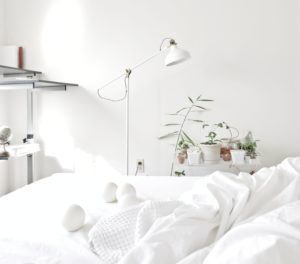Believe it or not, your bedroom could be keeping you up at night and not be the relaxing retreat it should be.
And given that sleep is a key building block of health and happiness, you can see why struggling to get shuteye for one night, let alone a string of several nights at a time, can be problematic in many ways – from lowering mood to reducing productivity.
Some of the reasons why you can’t sleep could be external – stress or health-related, perhaps. But your bedroom could be an issue too. This guide takes you through some of the reasons why your room may well be keeping you awake at night. Let’s get started with some of the basics.
There’s too much clutter
Lots of bedrooms become dumping grounds of the house, for a variety of reasons. But there is a good chance that if your room is piled up with things (and in particular, things you don’t need) it is impacting your sleep. The truth is that going to bed in a room you know is a mess is not relaxing – it plays on your mind. Plus, too many objects in a room attract dust and debris – which can cause you disturbances with breathing and coughing through the night. Create some clear space and your sleep will improve.
There’s too much dust
On the subject of dust, little mites thrive on all the dead skin cells and all the other kinds of microscopic things that float – and settle – in your bedroom. Your best bet is to ventilate and vacuum your room properly and clean your bedding as regularly as possible. Don’t forget your pillows, either, which can be a wonderful home for microscopic critters. It’s also a good idea to ban any pets from cuddling up to you in your bed – as much as that may dismay them, or you.
There’s not enough room
Some people love snuggling up next to their loved one every night. But are your romantic notions causing your sleeping problems? Sleeping too close together means that when one of you moves, it disturbs the other. If you have room, it could be a wise use of space to have a Super King Bed. It’s also a good idea to get something like a memory foam mattress, which will help reduce you feeling movement on the other side of the bed. For extra comfort, you can also look at civilizedhealth.com memory foam pillows.
There’s not enough air
Ventilation is very important. On days when it isn’t too cold, consider opening the windows for an hour or two. Once air circulates, this will create a fresher, cleaner atmosphere and more oxygen to breathe. It will also reduces condensation, which is vital as damp conditions are a major cause of asthma as well as other health problems. The Scientific Committee on Health and Environmental Risks calculates there are up to 900 chemicals in indoor air, with negative side-effects much more common in properties without adequate ventilation – so ventilating your home could be a serious way to safeguard your health.
It’s too hot/too cold
Some nights it’s too hot, and on other occasions, it’s too cold. The problem is that you induce yourself to sleep when you are resting and your core body temperature lowers. Therefore, if are too warm – or too cold – your body’s internal thermostat fluctuates a huge amount, which inevitably leads to restless sleep. So ensure the temperature in your bedroom is the right one for you. Play around with the thermostat in the winter and the air con in the summer to hit perfection – and get a better night’s sleep.
As you can see, there are many issues that can prevent you from getting a good night’s sleep. But there are lots of fixes, too – happy sleeping!



